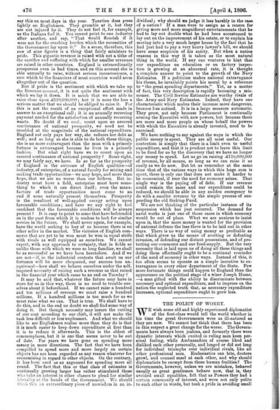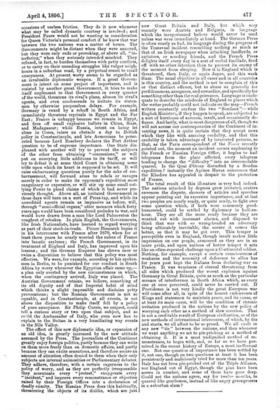THE POLICY OF WORRY.
WE wish some old and highly experienced diplomatist of the first-class would tell the world whether in his time the great Governments were as ill-natured as they are now. We cannot but think that there has been in this respect a great change for the worse. The Govern- ments have always been jealous, and formerly there were dynastic interests which excited in ruling men keen per- sonal feeling, while Ambassadors of course liked and disliked each other personally, and longed or did not long for individual triumphs over individual rivals, like all other professional men. Ecclesiastics can bite, doctors growl, and counsel snarl at each other, and why should diplomatists be exempt from those human frailties ? The Governments, however, unless we are mistaken, behaved usually as great gentlemen behave now, that is, they avoided small squabbles, felt that as Powers they had a certain community of interest, and were not only polite to each other in words, but took a pride in avoiding small occasions of useless friction. They do it now whenever what may be called dynastic courtesy is involved ; and President Faure would not be wanting in consideration for Queen Victoria's personal comfort if he knew that war between the two nations was a matter of hours. The Governments might be distant when they were annoyed, but they were only rude or provoking, or above all, " in- terfering," when they seriously intended mischief. They refused, in fact, to burden themselves with petty conflicts, or to carry on their unending struggles like vulgar neigh- bours in a suburban road, by a perpetual resort to small annoyances. At present worry seems to be regarded as an invaluable diplomatic weapon. If a great Govern- ment is intent on some project of importance, and is resisted by another great Government, it tries to make itself unpleasant to that Government in every quarter of the world, threatens its rival's plans, abuses its rival's agents, and even condescends to irritate its states- men by otherwise purposeless delays. For example, Germany is vexed by a rebuff in South Africa, and immediately threatens reprisals in Egypt and the Far East ; France is unhappy because we remain in Egypt, and fires off small explosive bullets in China, Siam, and Madagascar; while Russia, intent on being let alone in Corea, raises an obstacle a day to British policy in Constantinople, and lets Armenians be perse- cuted because Lord Rosebery declares the Port Arthur question to be of supreme importance. One State dis- pleased with another will try to prevent the subjects of the other from obtaining " concessions," or will put on annoying little additions to its tariff, or will try to defeat it at some third Court in obtaining some trifle upon which its heart is supposed to be set. It will raise embarrassing questions purely for the sake of em- barrassment, will forward arms to rebels or savages merely in order to make its opponent's expedition more sanguinary or expensive, or will stir up some small out- lying Power to plead claims of which it had never pre- viously thought. Above all, an irritated Government in these days will turn on a sort of Press-tap, and while its accredited agents remain as impassive as before, will, through " semi-official organs," utter menaces which forty years ago would have been considered preludes to war, and would have drawn from a man like Lord Palmerston the roughest of rebukes. In plain English, the Governments, like Irish Nationalists, have learned to regard worrying as part of their stock-in-trade. Prince Bismarck began it in his intercourse with France after 7870, when for at least three years he nearly worried the rulers of France into lunatic asylums ; the French Government, in its treatment of England and Italy, has improved upon his lessons ; and the German Emperor has shown once or twice a disposition to believe that this policy was most effective. We were, for example, according to his spokes- men in Berlin, to be punished for our conduct in South Africa by worry whenever the Egyptian affair came up,— a plan only averted by the new circumstances in which, when the contingency arrived, Italy was placed. The Austrian Government retains, we believe, something of its old dignity and of that Imperial habit of mind which thinks a slight impossible and disdains petty provocations ; but the Russian Government is not so equable, and in Constantinople, at all events, is not above the disposition to make itself felt by a policy of pure annoyance. Sir Philip Currie, we suspect, could tell a curious story or two upon that subject, and so co•rld the Ambassador of Italy, who even now has to explain to the Sultan in a very humiliating way events in the Nile Valley.
The effect of this new diplomatic idea, or expansion of an old idea, is greatly increased by the new attitude assumed by the Press. The journalists of the Continent greatly enjoy foreign politics, partly because they can write on them more freely than on domestic affairs, and partly because they can excite sensations, and therefore secure an amount of attention often denied to them when their only subjects are internal animosities or Parliamentary debates. They adhere, therefore, with a certain eagerness to the policy of worry, and as they are perfectly irresponsible they accentuate every " protest," exaggerate every " Incident," and improve every remonstrance or objection raised by their Foreign Offices into a declaration of deadly enmity. The Russian Press does this habitually, threatening the objects of its dislike, which are just now Great Britain and Italy, but which very recently were Austria and Bulgaria, in language which the inexperienced believe would never be used unless war were immediately at hand. The German Press is often nearly as bad, its language during the progress of the Transvaal incident resembling nothing so much as that of an Irish newspaper when attacking landlords, or agitators, or seceding friends, and the French Press delights itself every day in a sort of verbal fusillade, fired off with no other intention than to prevent its enemy of the moment from sleeping. Now it is England which is threatened, then Italy, or again Japan, and this week Siam. The usual objective in all cases and in all countries is this country, and the method is not to complain of this or that distinct offence, but to abuse us generally for perfidiousness, arrogance, and cowardice, and specifically for something other than the real grievance. Language is inade- quate to describe the misdeeds of England in places which the writer probably could not indicate on the map—French writers constantly confuse the two "Soudans "— while English Ministers, if they happen to speak, are subjected to a sort of hurricane of sarcasm, insult, and occasionally de- fiance. And lastly, what is most dangerous of all, though we will not accuse our contemporaries of the Continent of in- venting news, it is quite certain that they accept news which they like with amazing credulity, and that this credulity is taken advantage of by interested persons, so that, as the Paris correspondent of the Times recently pointed out, the moment an incident occurs unpleasing to the French or Russian Foreign Office, it begins to hail telegrams from the place affected, every telegram tending to change the " difficulty " into an irreconcilable quarrel. Is the Quai d'Orsay disturbed by a Soudan expedition ? instantly the Agence Havas announces that the Khedive has appealed in despair to the protection of France.
The total result of this ill-nature is very bad indeed. The nations attacked by degrees grow irritated, orators envenom the dispute, showers of articles and speeches appear pointing out its excessive importance, and at last two peoples are nearly ready, or quite ready, to fight over some question which, if both were commonly good- humoured, could be settled by diplomacy in half-an- hour. They are all the more ready because they are wearied out with incessant alarms, and disposed to think that war with so wrong-headed an adversary being ultimately inevitable, the sooner it comes the better, so that it may be got over. This temper is perceptible even in England, though insult makes little impression on our people, armoured as they are in an inner pride, and upon nations of hotter temper it acts like an often-repeated challenge upon a Continental soldier. Nothing, for example, except a certain consciousness of weakness and the necessity of deference to allies has for years past kept the Italians from declaring war on France. It was weariness of eternal threatening from all sides which produced the recent explosion against Germany in Great Britain, quite as much as the particular menace of interference in South Africa which, as every one at once perceived, could never be carried out. If Providence is not very kindly the great European war will come after all, in spite of the honest endeavours of Kings and statesmen to maintain peace, and its cause, or at least its main cause, will be the condition of chronic irritation produced in the nations by the new policy of worrying each other as a method of slow coercion. That is not a creditable result of European civilisation, or of the new methods of international intercourse, of which, by fits and starts, we all affect to be so proud. We all exult in any new " tie " between the nations, and then whenever we want anything we set to pin-pricking as a method of obtaining it. It is a most undignified method of re- monstrance, to begin with, and, so far as we have per- ceived in the recent history of Europe, a most ineffectual one. Not one question of importance has been settled by it, not one, though on two questions at least it has been persistently and maliciously tried for more than ten years. Italy has not been pin-pricked out of the Triple Alliance, nor England out of Egypt, though the pins have been scores in number, and some of them have gone deep. Could not the nations agree, say for twelve months, to quarrel like gentlemen, instead of like angry greengrocers in a suburban slum ?



































 Previous page
Previous page